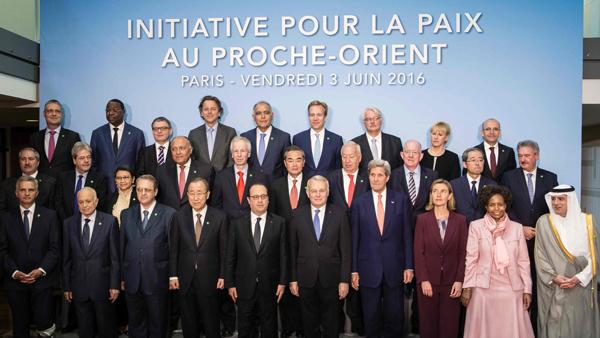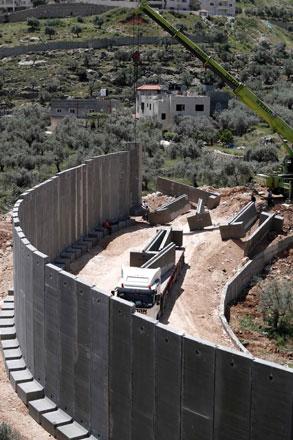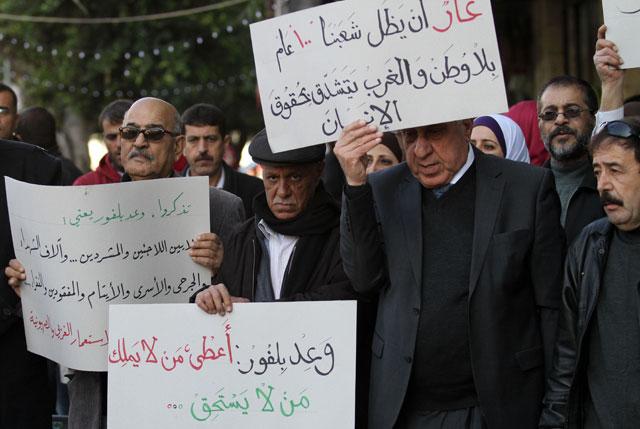You are here
Jordan says impasse in Mideast talks a threat to region, world
By Agencies - Jun 04,2016 - Last updated at Jun 04,2016

A group photo of the officials who participated in the Paris meeting to revive Palestinian-Israeli peace talks on Friday (AFP photo)
AMMAN — Jordan has reiterated the importance of reviving the Palestinian-Israeli negotiations on the basis of the two-state solution, to ultimately lead to the establishment of an independent Palestinian state on the pre-1967 borders with East Jerusalem as its capital.
Speaking at the international ministerial conference on the Israel-Palestine conflict and peace in the Middle East, which was held on Friday in Paris, Deputy Prime Minister and Foreign Minister Judeh said the halt in negotiations feeds extremism in a manner that threatens the stability and security of the region and the world, the Jordan News Agency, Petra, reported.
He reiterated that the Palestinian cause remains the region's core issue.
The foreign minister voiced Jordan's support for French efforts in particular and all efforts in general that aim at resuming the peace negotiations and ending the Israeli occupation and its violations against civilians and the land, especially in East Jerusalem and its sanctuaries.
Moreover, Judeh highlighted the importance of having Paris' international conference as a roadmap that paves the way to achieving the two-state solution instead of being a side event with no means of continuity and success.
At the meeting, France said a two-state solution to the Israeli-Palestinian conflict may soon be impossible, Reuters reported.
Palestinians have welcomed the French initiative but Israeli officials have said an international conference will not work and that only direct talks between the old foes can bring peace.
Neither Israel nor the Palestinians were invited to the conference, though the objective is to get them to negotiate after the US elections.
"The two-state solution is in serious danger. We are reaching a point of no return where this solution will not be possible," French Foreign Minister Jean-Marc Ayrault told a news conference after convening some 25 ministers mainly from the Arab world, Europe and the US.
A final communiqué said all countries present had reaffirmed the need for a negotiated two-state solution and that direct negotiations between the two sides should be based on existing UN Security Council resolutions, Reuters reported.
It warned that the status quo — a lack of headway towards a Palestinian state in territory occupied by Israel since the 1967 Middle East war — was not sustainable.
US Secretary of State John Kerry said the parties had discussed the possibility of convening an international conference by the end of this year, but that direct negotiations between Israelis and Palestinians would be the only way to achieve a solution.
"We need to find some immediate... steps on the ground that will make a difference," Kerry told reporters. "We need to work with the parties. Everybody agreed today that you can't impose a solution from outside."
Ayrault said the powers wanted work to begin by the end of June on a set of economic incentives and security guarantees to encourage the two sides to resurrect peace talks.
They would also seek ways to break deadlocks that scuttled previous negotiations and look at whether other peace efforts such as a 2002 Arab offer of peace to Israel in exchange for its withdrawal from all occupied land remain viable.
"The Arab peace initiative has all the elements for a final settlement," Saudi Foreign Minister Adel Al Jubeir told reporters, and it could not be watered down to suit Israel.
"It is on the table and a solid basis for resolving this long-standing dispute. It provides Israel with a lot of incentives and it's incumbent on the Israelis to accept that."
The European Union's foreign policy chief, Federica Mogherini, said it was the duty of international and regional players to find a breakthrough since the two sides appeared incapable of doing so alone.
The interim 1993 Oslo peace accords were meant to yield a "two state solution" within five years.
"The policy of settlement expansion and demolitions, violence, and incitement tells us very clearly that the perspective that Oslo opened up is seriously at risk of fading away," Mogherini told reporters.
She said the Middle East Quartet of the EU, Russia, the US and the UN was finalising recommendations on what should be done for the two sides to negotiate in good faith.
Related Articles
GENEVA — France will hold an international conference in Paris on May 30 in a bid to relaunch talks between Palestinians and Israelis by the
PARIS — France is trying to convince Israeli Prime Minister Benjamin Netanyahu to meet with Palestinian President Mahmoud Abbas in Paris thi
BRUSSELS — The EU said Monday it will explore setting up a new international format to breathe life back into the stalled peace process betw














